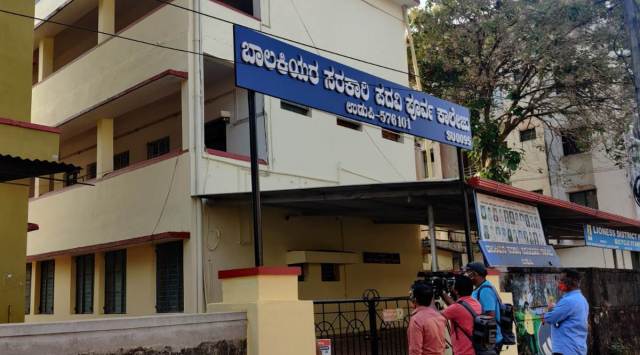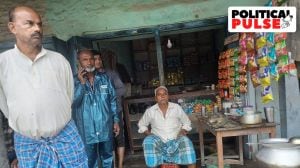Before hijab standoff, an anti-rape protest, faith, political rivalry
On December 27, the two girls were among the eight hijab-wearing students of the Government Pre-University College for Girls in Udupi who were asked to leave their classrooms, triggering a standoff that reached the Karnataka High Court and drew global attention.
 Colleges have remained shut since last Wednesday (February 9) amid tension in campuses over the hijab issue. (Express photo by Uma Vishnu)
Colleges have remained shut since last Wednesday (February 9) amid tension in campuses over the hijab issue. (Express photo by Uma Vishnu)In October last year, two months before the hijab controversy erupted in Karnataka, at least two students at the forefront of the agitation joined an ABVP protest against a rape in Udupi’s Manipal — and drew the attention of Campus Front of India (CFI), the student organisation affiliated to the radical outfit Popular Front of India (PFI).
On December 27, the two girls were among the eight hijab-wearing students of the Government Pre-University College for Girls in Udupi who were asked to leave their classrooms, triggering a standoff that reached the Karnataka High Court and drew global attention.
The Indian Express visited Ground Zero of the protests to piece together the sequence of events — and found a blend of political rivalry and students’ resolve for right of choice that sparked subsequent protests in the district’s Kundapura taluk and other parts of the state, where colleges that have for decades permitted students to wear their hijabs suddenly shut the gates on them.
Today, pro-Hindutva groups are in the fray, with students in saffron scarves turning up on campus, even as fingers are being pointed at the CFI, which has been accused by the ruling BJP, Opposition parties and Muslim organisations of blowing the issue out of proportion.
The CFI has accused the state government and BJP leaders of trying to shift the blame on it while saying that it fully backs the students of the Udupi college. It maintains that it stepped in only after the girls were denied entry into their classrooms.
But many point to that incident from October last year to suggest the outfit may have been involved even earlier. Several students, including the two girls from the Udupi college, had turned up for the protest organised by RSS-affiliated ABVP in front of the District Collector’s office in Manipal, seeking the speeding up of the investigation into a case of rape of an engineering student.
Sources in the college said the girls — both Hindus and Muslims — who turned up for the protest were marked absent for the day.
Soon after, a photograph began doing the rounds of social media in which a few Muslim students in burqa, some among them said to be part of the present hijab row, were pictured with a CFI banner. The accompanying caption read: “These students had participated in a protest without knowing that it was a protest by the ABVP. After Campus Front of India leaders counselled them today, they joined the Campus Front of India of their own volition.”
One of the protesting girls from the Udupi college confirmed to The Indian Express that two among them went to the Manipal protest “without knowing it was organised by the ABVP” and that the CFI “helped us” afterwards.
“It’s true that we counselled some of the students who went for the protest. It’s a disgrace to our community that the girls were attending a protest march organised by a fascist outfit. But all this talk of training is false,” said Masood Manna, state committee member of CFI.
Speaking to The Indian Express, Hazra Shifa, 18, one of the six girls who are now insisting on wearing the hijab to their classrooms, said that when they joined the Udupi PU College (Classes 11 and 12) in 2020, it told their parents about the no-hijab policy.
“They pleaded, said we have always worn the hijab and that we would be uncomfortable without it. Once, when we were in 1st PUC (Class 11), some of us tried to wear the hijab, but our teachers scolded us,” says Shifa, a second-year PUC science student at the college.
Like Shifa, most Muslim students come to colleges in their burqas, which they remove in the “ladies room” before proceeding to class. The hijab is usually the scarf or dupatta that’s wound around their heads. The policy on the hijab, so far, had been left to individual colleges.
On February 5, with the protests escalating, the state government directed that students in all government PU colleges must follow the rules for uniforms set by local college development panels and that in colleges where no uniform is prescribed, efforts must be made to ensure unity.
Shifa said a few of the parents, including hers, made several representations to the school principal, asking for them to be allowed to wear the hijab, and that they approached the CFI for help only when the talks failed.
Principal Rudre Gowda did not respond to calls and messages from The Indian Express.
BJP leader Raghupati Bhat, who as the local MLA heads the College Development Committee, said: “In all these years, there was never a problem. Girls would come wearing their burqa and hijab, and where there was a uniform code, they would remove it. And in colleges where there was no such code, they would wear it peacefully. Now because of a few indisciplined girls who have been misled by the CFI and PFI, everyone is being made to suffer and the communal harmony that Udupi was known for has been disrupted.”
The all-girls PU college, where the issue first began, has a high school and pre-university wing. Of the 599 PUC students in the college, 75 are Muslims. “So why are only these girls protesting? Till the last working day, the others had been sitting peacefully and studying. It’s clear that these girls had been instigated,” Bhat said.
The CFI’s alleged role in the Udupi incident has also led to schisms in Muslim Okkoota, a grouping of six major community organisations that includes the Jamaat-e-Islami Hind, PFI and Tablighi Jamaat, among others.
Husain Kodibengre, district president of the Association for Protection of Civil Rights, one of the NGOs that coordinates with the Okkoota, accuses the CFI of escalating what could have been “easily managed within” the college.
“The Muslim Okkoota held several meetings with the principal, the CDC, the local MLA and the parents and it was agreed that it’s a minor issue that can be tackled at the school level. The CFI agreed to all this in the meeting, but then went ahead and shared pictures of the girls sitting outside their classrooms. That went viral. And the BJP, of course, happily lapped it up. They got an issue on a platter,” he said.
U T Khader, MLA from Mangalore constituency in the neighbouring Dakshina Kannada district and the only Congress legislator from 16 seats of the coastal region, says with Hindutva groups jumping in, students in colleges where the hijab was never an issue had to face the brunt.
On February 3, images of the Kundapur college principal shutting the gates on hijab-wearing Muslim girls, as they pleaded to be let in, triggered outrage across the country. “It was the mistake of the management in Kundapur. Instead of locking the gates on the hooligans who turned up in saffron scarves, they shut the gates on these girls who have always been wearing the hijab to college,” said Khader.







